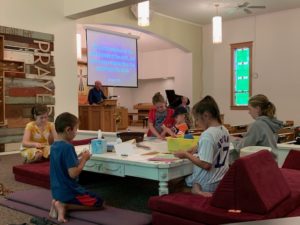Join Us Sunday Mornings

10 A.M. Worship

Teaching & Preachings
Genesis 1:26 says;
Then God said, “Let us make man in our image, after our likeness. And let them have dominion over the fish of the sea and over the birds of the heavens and over the livestock and over all the earth and over every creeping thing that creeps on the earth.”
Recent Devotionals
September 2020
August 2020
July 2020
Recent Posts

JOHN 3:16 – WHAT IT REALLY SAYS

This Sunday we will continue our “Foundations of Scripture” series that began 3 weeks ago with Matthew 25: 31-46, and then took us to The Book of Jonah 2 Sundays ago. I hope you have made time to go back to reflect on those amazing stories of God’s truth!
Since last Sunday was pulpit exchange Sunday, we took a week off from the series. But now we’re back — and this Sunday we’re returning to the New Testament, and specifically, to perhaps the one most popular and cited verses in the entire Bible — John 3:16.
You might have heard it before:
For God so loved the world that he gave his one and only Son, that whoever believes in him shall not perish but have eternal life.
That’s the NIV (New International Version) translation — one most commonly cited.
But here’s The Message version of the same verse:
This is how much God loved the world: He gave his Son, his one and only Son. And this is why: so that no one need be destroyed; by believing in him, anyone can have a whole and lasting life.
Interesting, isn’t it? You may prefer the NIV translation because it is the one commonly recited, and thus the one we know best. But maybe The Message version says it best! How much does God really love us? Well, Jesus says, let me tell you. This is how much!
Though we often focus on this one specific verse, John 3:16, we also need to understand the context of the entire scene in the 3rd chapter of the Gospel of John. Here’s what’s happening: A well-known religious leader of the Jews named Nicodemus has come to Jesus in the middle of the night to learn more about this Kingdom of God that Jesus has been announcing and explaining. Jesus tells Nicodemus that one must be “born from above” in order to see this Kingdom, and Nicodemus then asks Jesus how could an old man possibly be returned to his mother’s womb in order to be born a second time .
Jesus explains to Nicodemus that this new birth isn’t about being born of the flesh — one must also be born of the spirit. Without both, the flesh and the spirit, Jesus says, one cannot possibly know or understand the Kingdom of God. Then, as Nicodemus is struggling with that notion — Jesus tells him why this is so important: And this is when Jesus recites the verse of John 3:16.
The Kingdom of God, you see, is all about God’s unusual love for the world … and thus, God’s same unusual love for Nicodemus himself. To understand the truth of the Kingdom, we must be born again with the Spirit from above (Holy Spirit) so that we can understand who God really is and why we would want to be re-born in order to access the Kingdom of God.
But then it gets even better! In the very next verse, John 3:17, Jesus tells Nicodemus the mission God is on through this divine love, including sending his Son to be sacrificed for all humanity:
Again –let’s look at the NIV translation first, and then The Message version:
NIV: For God did not send his Son into the world to condemn the world, but to save the world through him.
The Message: God didn’t go to all the trouble of sending his Son merely to point an accusing finger, telling the world how bad it was. He came to help, to put the world right again.
You see, Jesus didn’t come in order to create a new religion that would further divide the world between those who “believe” in Him and those who don’t. John 3:16 is not a tool to help us figure out who is right and who is wrong – or good and bad – or worthy and unworthy – or saved and condemned. John 3:16 is not a spiritual insurance policy for those who say they are “believers” so that they can be assured of their salvation, and assured of others condemnation.
No! That common interpretation of John 3:16, and others like it, completely miss the truth that Jesus is teaching to Nicodemus. Instead of using these words of Jesus to separate us between the saved and damned, Jesus is actually telling us that God sent the Son so that the whole world could be saved — made one — healed – and put right again.
Jesus came so that we all could have the Kingdom of God again — right here and now! This verse is not about who is in and who is out. Jesus is teaching us that we are all in! Through Jesus’s coming to the world and giving up His life for us, He is intending to save the whole world – not just some.
Remember — Jesus is teaching this “new” truth to one of the most religious and devout individuals in his own faith tradition! Clearly — this isn’t just “Good” information — but it is also “News” information. Indeed – this “Good News” is so “new” that many religious and devout people, both then and now, have yet to hear it … much less believe it!
Just to give you a hint of our hang-ups in understanding this new truth — here are 2 common misconceptions we have about this wonderful verse:
1) This teaching is intended to be about YOU! It is PERSONAL! Jesus is teaching this truth to one person – Nicodemus — and it is applicable to all of us — it is universal and eternal. Instead — Christians use this text “corporately” — to define a doctrine of a religious movement that today is called Christianity. If you happen to “believe” in Jesus (can someone please tell me exactly what that means?) then you are saved! As in — one of us! If not — too bad. Eternal damnation for you.
2) Which brings us to another misconception we have about this truth. Christians often project this teaching into the future –as in “the next life” — as in heaven and hell after life on earth. But Jesus’s conception of heaven and hell is in the present — not the future. He wants the Kingdom of Heaven NOW! He doesn’t want you to have to live in hell NOW! This text is not about salvation at some later time — it’s all about your salvation and eternal life right now. Jesus isn’t telling Nicodemus how to stay out of hell when he dies. He’s telling him how to have the Kingdom of God today! For Jesus, Hell, for Jesus, is literal and present — not conceptual and later.
I hope this gives you some grist for the mill – some spiritual food to chew on.
Come to church this Sunday and let’s see where God takes us. It appears we have much to learn about John 3:16 that perhaps we never knew!
God loves the whole world so much!
Pastor Bob
Read more

PASTOR BOB’S NEIGHBORHOOD

Hello everybody. Today we’re going to talk about “good words.”
What “good word” is it that you want to hear from me today?
Do you prefer the word of “Us vs. Them”? It’s such a soothing word, after all, because we are always “us” … and they are always “them.” Its “good” to be on the right side with God, isn’t it? And it’s “bad” to be on the other side. So, do you want me to assure you today that you’re on God’s side … the right side … our side?
Or maybe you prefer the “chosen people” word today. It’s comforting to know that God loves us more because we know the truth. After all, Jesus said, “the truth shall set us free.” And we do know the truth, right? Well, uh, at least we know our truth … and our truth is always right! Would you like me to congratulate you today for your version of the truth?
Then again, maybe it’s a good day for the “Jesus is like us” word. That’s always reassuring! Have you seen his picture lately? I think we might be related, he looks so much like my second cousin, Patrick. The blue eyes. The long blond hair. And the thing I love most … that “America First” button! Would today be a good day to thank God for making Jesus just like us?
Or, perhaps you have your favorite “good words.”
I put “good word” in quotes, because we all have those good words that reassure us of who we are; justify our way of life; clarify our goodness and rightness; and situate us right smack dab in the path of God’s light. Those are really good “good words,” aren’t they?
But there are some other “good words” that we might want to consider. These are the words that come straight from the Good Shepherd. Sometimes these words are not so soothing or comforting. In fact, often these words are challenging and lead us to reflect upon who we really are and how we are living our life.
I wonder if you would like to hear some of those words today.
Hello? Hello? Is there anyone still here?
Oh … hi there … I’m so glad you stuck around! Did you notice how the crowd just got a lot smaller?
So let’s move on. You see, the good words that I will share with you today are special words. Some people call them, “red-letter words.” That means that they are words spoken directly by Jesus himself. And though Jesus didn’t speak English (and He wasn’t American either!), He did have some very important words to share with us about how to live like He did.
Now, I don’t know if that’s something you’re really interested in. I have discovered that many more people say they are, than really are. It seems many people prefer the “good words” like the ones I talked about before: the “Us and Them” words; or the “Chosen People” words; or the “Jesus is like us” words. There are many other versions of these kinds of good words. But they are not “red-letter” words.
Jesus gave us His “good words” because He loves us so much that He doesn’t want us to stay the way we are – He wants us to become more like Him, a little bit each day! Those other good words are nice, but they won’t help us become more like Jesus.
But His “good words” will! These are legit “red-letter” words straight from the mouth of Jesus … directly into your waiting heart. So, if you’re ready for them, spend some time with each of these “good words” this week. Cut these out and tape them to your fridge … and then pick one each day to try to live up to.
If you’re willing to do that, then you’ll find yourself changing … and becoming more like Jesus. And really, that’s all He ever wants from you!
GOOD RED-LETTER WORDS FROM THE GOOD SHEPHERD:
- Love your enemies.
- Do good to those who hate you.
- Bless those who curse you.
- Pray for those who abuse you.
- If anyone steals your coat, give them your shirt as well.
- Give to everyone who begs from you.
- Do not judge others.
- Do not condemn others.
- Forgive, and you will be forgiven.
- Give, give, and give some more – for the measure that you give will be the measure that you get back.
Hope you enjoyed these “good words” — Pastor Bob
Read more

“From the Belly of a Whale”

Have you ever been caught in the belly of a whale? To answer that question accurately, you’ll need to know the context of the story. And this week we will attempt to do just that as continue our “Foundations of Scripture” series that began last week with Matthew 25, and continues this week with The Book of Jonah.
But before you move on to Jonah’s great biblical escapade, let’s not leave Matthew 25 too quickly. Here are some suggestions for the rest of this week:
- Write down or copy the text from Matthew 25: 37-40 (it was printed in last Sunday’s bulletin) and tape it to your refrigerator – so that every time you go fetching for food, you will have another opportunity to read and think about this great lesson from Jesus;
- Write down of copy the text from Matthew 25:40 (it was on the cover of last week’s bulletin) and stick it to your bathroom mirror so that this verse becomes your “memorization verse” for the week – as you stand in front of your mirror you can literally recite it over and over and commit it to memory;
- Grab your “Kind Like Christ” checklist from last Sunday (special thanks to Karaline, Annabelle, McKenna & Ally!) and get to work … for a kinder world. We will have more ‘Kind Like Christ” checklists available this Sunday at church!
Now, let’s get back to that question I started with: Have you ever been caught in the belly of a whale? Literally … almost for sure, NOT! But what about figuratively … metaphorically … almost for sure, YES. Whether you call it “the belly of a whale,” or “between a rock and a hard place,” or “up the river without a paddle” or “rock-bottom,” or, as it was frequently in the Bible, in the fasting in the wilderness or exiled in the desert – we ALL know the experience of Jonah being caught in the belly of a whale.
This Sunday I’m going to the Old Testament for our “Foundations of Scripture” to teach the “simple, but not easy” story of Jonah, God, and Nineveh from the Book of Jonah. The Book of Jonah is only 4 chapters long, but for its size it probably gets more attention than most books of the Bible that are much larger. The main reason: It’s a simple yet entertaining story. if you know anything about the Book of Jonah, you probably know it’s about Jonah in the Belly of the Whale – which makes for a great kid’s story at church (and a really good trunk-or-treat decoration!). It’s also very prevalent in VBS curricula, so almost everyone first learned of this story when they were youngsters.
But even with its simplistic characters and entertaining theme, the story of Jonah makes for strong and hard teaching about who God is and how God shows mercy to all peoples — and also about who we are (Jonah) and how we struggle mightily with the idea that God could care about even the most despicable humans on earth.
Ultimately, this story teaches us that God pursues every single person, and welcomes home any repenting sinner … even you and me … and our worst enemies! As we learn from Jonah, coming to terms with the truth about who God really is, and then putting that into action in our daily life is a most insurmountable challenge … especially without God’s help. On the other hand, with God’s help … anything is possible!
So, we’re not off the hook because it seems so hard! This little “simple, but not easy” story will help us come to terms with what it means to be a servant of God in a world of other masters. And you won’t be surprised to learn — it’s much harder than you might think. Just ask Jonah, who’s famous “last words” are, “I do well to be angry … even unto death!”
That is NOT God’s plan. God’s plan for you is just like it was for Jonah: God wants (needs) you to go to the hard places in order to spread the “Good News” about the redeeming love of God and how, according to God’s plan, we can all live in harmony together, if we’re only willing to trust God.
It’s worth asking, isn’t it?
- “How am I being called by God today to apply the story of Jonah to my life?”
- “What does the story of Jonah teach us about how we as followers of Christ should be responding to our current national and global situations?”
- “Where do the ‘people of God’ stand AND act on issues of oppression, discrimination, and war?”
- “What is justice in the eyes of God?”
- “What does it mean to be a ‘patriot’ and a ‘follower of Christ’? — And is that even possible?”
I’ll meet you in the belly – God’s got some work for us … Pastor <>< Bob
Read more
Meet Some Of Our Team


Send us a Message
Contact Info

 Subscribe to sermon Podcast RSS
Subscribe to sermon Podcast RSS Subscribe to iTunes podcast
Subscribe to iTunes podcast


